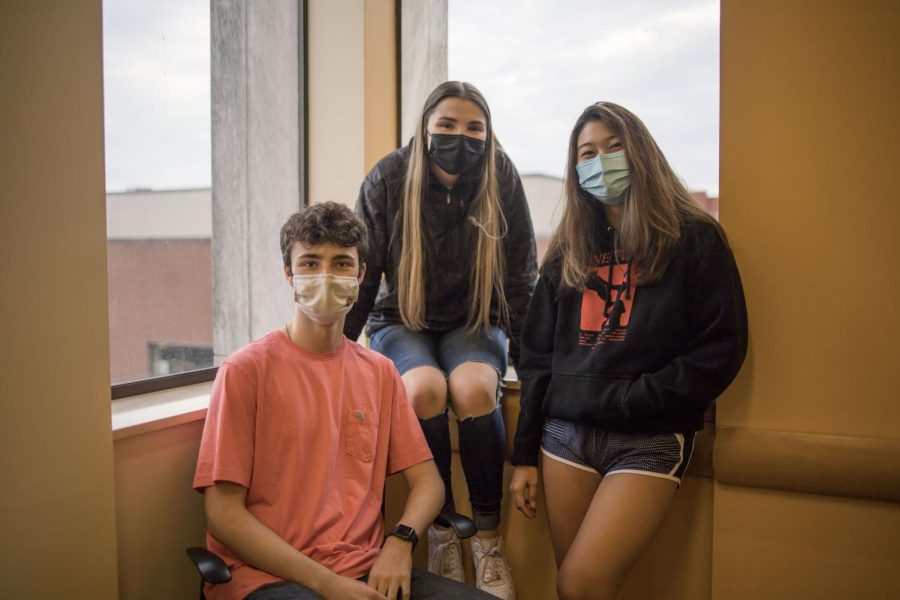Honors Innovation Cohort Loses Second-Year Students
From left to right: Luke Najarian, Noja Lajauskaite, and Kelsey Ota
At the end of fall quarter, five second-year students are planning to drop out of the Innovation cohort in the Honors Program at Seattle University. University Honors Director María Bullón-Fernández commented on the number of students dropping out of their cohort this quarter.
“If it’s five students from a track, from the same year, it would be a little surprising, not very normal. But you know, the pandemic is also a factor here,” Bullón-Fernández said.
The Honors Programs have been an alternative to the Core Curriculum at Seattle U since 1959. Each year, the Honors Program accepts cohorts of approximately 20 students for each of the three tracks: the Intellectual Traditions track, the Society, Policy and Citizenship track and the Innovations track.
There are numerous factors that students take into account when deciding to stay enrolled in the Honors Program or discontinue the program. Each Honors student receives priority registration, which allows them to register for classes before other students despite their year in school or how many credits they have completed. Students also receive a scholarship of $1,800 per year in addition to any financial aid they receive.
Kat Azure, Noja Lajauskaite and Luke Najarian are three of the five second-year students dropping out of the Innovation track cohort.
“I really like the cohort aspect. I like all of the students and the professors for the most part, give or take a few, have been pretty good as well,” Najarian said.
Azure and Lajauskaite expressed the same sentiment regarding the positive benefits of the cohort community.
Azure, a criminal justice major and psychology minor, chose to enroll in the Innovation track with the benefits of the program in mind.
“I originally selected to be in the Honors Program because of the priority registration and the scholarship because I am a low-income student so that sounded pretty good to me,” Azure said.
When Azure was first thinking about leaving the Honors Program at Seattle U, she had to consider what losing the scholarship might mean for her.
“The scholarship tripped me up a little bit. It is $600 per quarter but it wasn’t substantial to me when making my decision [to leave],” Azure said. “It is quite a bit of money but it isn’t enough for me to jeopardize my mental health.”
Lajauskaite, a nursing major and psychology minor, and Najarian, an environmental science major, chose the Innovation track because it is the only track in which nursing and STEM can enroll. This restriction allows for STEM and nursing students to fulfill required major credits while completing their Honors requirements.
Due to the cohort system, the Honors students have little to no flexibility when fulfilling the program’s requirements and must plan their major’s required courses around the Honors classes.
Difficulty scheduling courses as a nursing major is one of the main reasons that Lajauskaite is leaving the Honors Program.
“I feel like I am focusing way more on Honors than my major. I am trying to minor and it is getting really hard to plan especially with clinicals. It’s so hard to plan when it is the same four time slots allocated for Honors,” Lajauskaite said.
The Honors Program meets with the College of Nursing once per year to discuss the course requirements. The programs have created a template for nursing students to follow in order to fulfill the requirements, according to Bullón-Fernández.
“We are in constant communication with advisors from other colleges,” Bullón-Fernández said.
Azure, Najarian and Lajauskaite cited dissatisfaction with the course curriculum as another major catalyst for their decision to discontinue with the Honors Program.
“Spring quarter we had a lot of controversial readings. I am Native American and they had readings referring to Native American people as ‘savages’ which was very off putting for me. We had to have a bunch of meetings with that professor and our previous advisor,” Azure said.
In these meetings, the students requested “to hear more of the Native American perspective on Jesuit explorations,” according to Azure. In response to the meetings, optional readings were given to the class with the inclusion of Native American perspectives.
Anna Penticuff, a biology major in the Innovation track, plans to continue with the Honors Program next quarter. She agrees that the curriculum lacks diverse perspectives.
“It’s a very, very eurocentric curriculum. There have been some professors who have been really receptive and trying to widen the perspectives that we are reading. But especially last year it was all learning about Rome, Greece and it’s just super, super Western. Right now, in one of my classes, for the first time we are reading Islamic thought from the 13th century,” Penticuff said.
The nascent years of the Honors Program in the 1960s emphasized Western perspectives. Bullón-Fernández is aware of the program’s history of focusing on Western perspectives and asserts the program is becoming less eurocentric.
“It has evolved into moving beyond centering the West. It has much much more of a global perspective in many of the classes including towards the end,” Bullón-Fernández said.
While the Honors Program has many benefits, five students so far this year have said that the negatives outweigh said benefits—causing them to leave. While the Innovation track is trying to broaden its curriculum, the changes made by the administration were not sufficient to retain these students. The Innovation track will be losing approximately a quarter of its cohort at the end of fall quarter.


